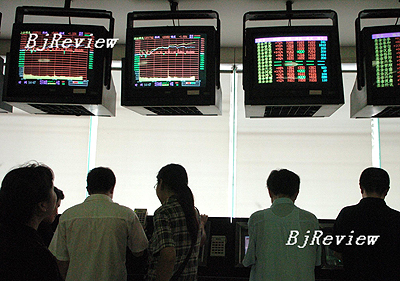
Special Measures
"The special bonds are just a substitute for the central bank notes. For most of the commercial banks, the special bonds provide them with a new choice
of credit."
-Xia Bin, Director of the Financial Research Institute of Development and Research Center of the State Council
By TAN WEI
On June 29, after having been approved by the Standing Committee of the National People's Congress (NPC), the Chinese Ministry of Finance announced that it would issue 1.55 trillion yuan in special bonds in order to buy $200 billion in foreign currency to fund China's new overseas investment company. The interest rate of the book-entry treasury bonds is to be decided by the market.
The 1.55 trillion yuan in special bonds is equivalent to the aggregate amount of treasury bonds issued in the past five years and is the largest bond release since the founding of the People's Republic of China.
The large-scale issuance of special bonds has caught the attention of people from all walks of life: The value of the special bonds equals 10 percent of all household savings deposits and is tantamount to raising the reserve requirement ratio eight times.
Will the tidal wave of special bonds wash away market liquidity? Who is going to buy the special bonds? Will the bonds effectively ease liquidity and, at the same time, ease the surging trade surplus? These are questions being posed to the Ministry of Finance's decision.
What's so special?
This is the second time in the history of new China that the government has decided to issue special bonds in an attempt to deal with financial difficulties. The first was in 1998, when China issued 270 billion yuan in special bonds to inject capital into state-owned commercial banks in an attempt to raise their capital adequacy ratios and international competitiveness.
In recent years, under the currently unbalanced international economy, both the current and capital accounts of the China's international payments have surpluses, leading to high liquidity in the domestic market. The excessive liquidity will ignite inflationary pressure and prop up domestic investment and credit as well as overheat the economy, negatively influencing economic development.
The move is intended to harness the excess liquidity in the domestic economy, said Finance Minister Jin Renqing. Cash in circulation has been blamed for the skyrocketing rise of the stock market and real estate prices, hinting at an emerging economic bubble.
In order to resolve the liquidity problem, the Ministry of Finance, the People's Bank of China and the State Administration of Foreign Exchange have studied ways to buy foreign exchange (forex) through the issuance of special bonds. The State Council passed the proposal that the Ministry of Finance should issue special bonds. The proposal also was approved by the NPC Standing Committee.
Currently, macroeconomic control measures mainly include raising bank reserves and increasing the interest rate as well as issuing central bank notes. Since 2006, the central bank has raised the reserve requirement ratio eight times and the interest rate four times. So far this year, 2.5 trillion yuan in central bank notes have been issued.
The buying and selling of special bonds will help rein in liquidity, Jin Renqing believes. "When the liquidity shows signs of excessiveness, the central bank can sell special bonds to withdraw currency in circulation, and vice versa," Jin said.
Yin Jianfeng, an expert at the Institute of Finance and Banking of the Chinese Academy of Social Sciences (CASS), believes issuing bonds can ease the central bank's burden of supplying central bank notes and raising the reserve requirement ratio when dealing with liquidity problems, so that monetary policies can be more flexible.
| 